September 05, 2004
The Hugo Awards: A Nominee's Perspective
As I warned people in my Thursday post, I wouldn't be able to blog again until today, because from Friday night to Saturday night I was observing shabbat, and I figured that I wouldn't have time to post elsewhen. There's a lot I could post about, but I thought I would give everyone a nominee's-eye-view of the Hugo Awards.
I have to admit that I have a relatively skewed perspective on Worldcon. I've only managed to make it to four Worldcons in my life, and at each one of them, I was a Hugo nominee. (I missed two others at which I was a nominee.) So from my perspective, I've always had set plans for the Hugo evening. And this is how it worked this year.
At 6 PM, Nomi and I (along with friend and assistant Julia) went to the pre-Hugo reception. This is a big closed party, where nominees and their guests have a chance to chat, along with the presenters, MC, and people running the show. In reality, it's kind of a way to make sure that all the nominees are corralled, so if someone said they would be on hand to accept their Hugo, they're actually there. They do provide a level of food and drink, and there's a lot of people around in fancy dress all perspiring in nervousness because they don't know what's going to happen. I talked with a lot of people and have to admit that it's hard to remember many of the conversations. I do recall the following, though. Nomi came up to me at one point to say that she had been talking to Phil Klass (William Tenn), and that he had told her that I was an excellent writer and that I had written an excellent story.
Delighted, I approached Tenn to thank him. To my face, he said, "You're welcome. After all, your story was not as poorly written as it could have been."
We all love William Tenn.
At 7:45 PM, they escorted all of the nominees into the auditorium, where they had reserved a block of seats for us. And then we had the ceremony. When you're a nominee, you have sit and wait through a ton of other presentations while you wait for them to announce your category. No matter how short the ceremony, the wait is interminable. Throughout, I was sitting, very nervous, holding Nomi's hand, and hoping that when George R.R. Martin opened the envelope, he'd read my name aloud as the winner in the Short Story category.
Of course, at this point we all know that Neil Gaiman won, and Neil was very funny as he accepted his Hugo. So the question people now ask me is how do I feel. There's an old saying that it's an honor just to be nominated, and while that is true, I hope people would understand that someone who loses will still feel a certain level of bitter disappointment, and that the joy of being nominated is separate from the frustration of having lost.
On the other hand, I have a few wonderful things to hold onto. According to the voting breakdown, my story had the most nominations of any in the category - including Neil's. And I placed a strong second, implying that had Neil's story not been on the list, I probably would have won.
After the ceremony, we went to the Hugo Loser's party, where I hugged Sue Francis, thanked Michael Rennie for some apple juice, and made some reconnections with some good friends. And then we left, to join Bob Greenberger in the Rhode Island Science Fiction Club Suite, to watch some excellent hula dancing and let out the last of my tension as we watched Donna's hips sway to the music.
I'll report more later if I can -- and here's a shout-out to the lovely Dawn Burnell, who writes about having attending my reading in her Sunday blogging.
Posted by Michael A. Burstein at 07:40 PM in 5-Saturday | Permalink | Comments (2)
Saturday & Hugos
Saturday
After my late night Friday, and a late night Thursday and very little sleep before flying, I slept in on Saturday morning. I woke up with barely enough time to shower and dress and grab food before Jay Lake's SFF.net reading. Jay is a friend of mine and I hadn't ever heard him read before. He read two stories: "Angel's Daughter" (my request) which appeared in the June Realms of Fantasy this year and "Crimson Mud, Drying Blood". I'd read "Angel's Daughter" before, and was thrilled to hear his intonation. I had not heard the other story, which was very interesting and more than a little disturbing. But very, very good.
After that I ran down to the panel "Tough Love for New Writers". There, I was discouraged from writing, told that I could very well be turned into a little ball of sobbing jelly, informed that I would not be respected by the rest of the world, and that for $50 a year Gavin Grant would tell me I was a writer. Basically, the editors and writers of the panel wanted to tear down any aspiring writers. There was a morbid humor going on, and there were a lot of laughs. But the take-away message was that you will not find happiness in being published, selling your first novel, becoming a SFWA member or winning the Hugo. You must be happy within yourself. If you happen to write and get published during that, good for you. It was a sobering panel, but it was a kindness. Anyone who could sit through that panel and know that they were being serious for the majority may have the makings to become a writer. But if someone sat through that panel, knowing they were serious or thinking they were joking, that person most likely doesn't have the resilance and ego to truly make it in the field.
I am a masocist and really had heard most of it before and said some of it before. And yet, I still want to be a writer. In fact, it energized me to send out more stuff, silly as that sounds.
My panel for the day checked off I ran up to the room to gather some supplies and then out to grab some nylons and hydrating drinks from the Walgreens. I changed into my formal dress and bounced down to the Hugo Pre-Reception to "be pretty, smile and entertain the guests."
I believe I acquitted myself well. And I figured out I know more people than I thought I did among the Hugo nominees. I know Jay Lake (up for the Campbell and a Hugo). I worked for Charles Brown of Locus (up for yet another Hugo) and knew some of the other Locus crew. I (now) know Michael Burstein (up for the Hugo) and his wife Nomi. I had met Ellen Datlow (up for a Hugo) and Teresa Nielson Hayden (presenting a Huog) earlier during the Con and both were happy to talk to me. I had met John Joseph Adams (assistant editor at F&SF, his boss was up for a Hugo) earlier this con. I knew Frank Wu (up for a Hugo), though he showed up very late. And anyone who I had not already met was more than willing to talk to me anyhow. It was a lot of fun and I just enjoyed the wash of conversation and the feeling of being there. The nervous energy was running high and it rubbed off on me (and several others, as they confided in me).
The walk over to the ceremony was a thrill in itself. I got to help chase Neil Gaiman out of the room to the hall, and he was putting the finishing touches on his Toastmaster notes. I got to walk through the special "Not an Entrance" entrance. I got to sit in the second row of the ceremony and look up to see my husband working the follow spot. None of this I would have believed before coming to the Con. I would have bet on being up in the nosebleed section or waiting in line for 2 hours to get on the ground level.
The ceremony was a lot of fun for me. I enjoyed the speakers and thrill of the annoucements. There were the normal Hugo strange events ["Filthy Pierre" winning two of the special awards, winners being annouced early due to technical glitches, papers being shuffled, speakers running over, etc.]. I got to whistle and cheer for Frank who won the Hugo for Best Fan Artist. He was stunned and so cute. I got to stand up in happiness for Jay, and I can now say "I told you so" to him about the Campbell. I smiled when Neil was given his second Hugo. And I had the fun daydream of thinking some day I would be up there. (yes I know, it is not the end all of being a writer but it a nice spiffy daydream)
After that I realized I had not had much food (there was finger food at the pre-reception but I was trying very hard to keep talking so I didn't eat much) and went to get food. My body informed me at that point that I had not been eating enough, or drinking enough, or sleeping enough. So I got some food, didn't finish all of it and crashed. It was only midnight [early for a Con], but I was dead tired. My husband became my designated socialite and he stayed out drinking and courasing until early that morning. In my dreams, silver rockets danced.
Posted by Dawn Burnell at 04:00 PM in 5-Saturday | Permalink | Comments (0)
Saturday: Panel reports
The first panel I attend is on paranormal romance, with Catherine Asaro, Charlaine Harris, Sue Krinard, Sandra McDonald as moderator, and Diane Turnshek, who I realize I was working with on Wednesday night, hanging signs on the pillars in the concourse. Some things that spring to mind: paranormal romance is on the rise, and while angsty werewolves and sexy vampires have their place, the field has a lot more than that going on. One conclusion, in the words of Diane Turnshek: science fiction and romance go together like peanut butter and chocolate. After the panel, I head out to spend far too much money in the dealer's room.
Afterwards, I head over to the panel on Tough Love for New Writers, with Gavin Grant, David G. Hartwell, Steve Miller, Priscilla Olson, and Teresa Nielsen Hayden. I already know most of the reasons why nobody should ever be a writer, so I'm not learning new information, but the discussions of why SFWA membership should never be a primary life goal and the able career planning advice of Gavin Grant ("[What you should try to do is] write, and don't get published, and die. And you can do those things") make it a fun-- is depressing-- panel. My favorite bit comes at the very end, however, when Teresa Nielsen Hayden tells us that if you're a person who can't do anything but be a writer-- if you're someone who will write no matter how much you try not to-- then you might as well try to write well, and get someone to pay you for it. I find myself liking this advice.
At the end of the panel I rush to the Concourse to sign up for a literary beer, making it barely in time as the last signature on the list. I then head up to the Snowball Earth presentation, which is being given by an old professor of mine, Paul Hoffman. I'm running late, but I figure I can slip in the back and then go up and say hi afterwards.
When I arrive, however, the presentation hasn't started-- and Paul Hoffman is nowhere to be seen. Janine Ellen Young volunteers to moderate a panel until Hoffman arrives, takes the stage, and asks is anyone in the audience knows anything about Snowball Earth-- and since I took a seminar from Hoffman which wound up focusing on the Snowball, I raise my hand and wind up on the panel. Janine Ellen Young moderates wonderfully. Also pinch-hitting on the panel-- and doing a great job-- is Richard Lovett, who's working on an article on Snowball Earth for Analog. I periodically burble about stratigraphic sequences and carbon dioxide and hope I'm making something approaching sense. The audience asks great questions, and I walk out of the thing feeling rather like I got hit by a lemon wrapped around a brick, only in a good way. Mind you, the real pan galactic gargle blasters won't be coming for a few more hours.
Posted by Gen Jules Reynolds at 01:57 AM in 5-Saturday | Permalink | Comments (0)
The Hugo Awards
My apologies once again for the fuzzy pictures. I was taking them from the projection screen in a low light situation without a tripod, so they aren't so great, but maybe better than nothing...
 Neil Gaiman was Master of Ceremonies for the evening.
Neil Gaiman was Master of Ceremonies for the evening.
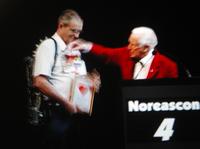 Dave Kyle presents the Big Heart Award to Erwin "Filthy Pierre" Strauss for his years of service to fandom. Filthy responded to a standing ovation by saying that he liked doing what he did, and planned to continue doing it. In a bit of a coincidence, the Noreascon 4 Special Committee Award was also given to Filthy, occasioning a second standing ovation.
Dave Kyle presents the Big Heart Award to Erwin "Filthy Pierre" Strauss for his years of service to fandom. Filthy responded to a standing ovation by saying that he liked doing what he did, and planned to continue doing it. In a bit of a coincidence, the Noreascon 4 Special Committee Award was also given to Filthy, occasioning a second standing ovation.
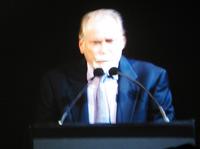
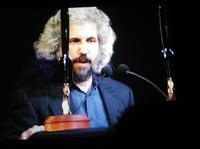 Hugo designer Scott Lefton describes this year's Hugos, which featured rocket flames formed from copper and brass.
Hugo designer Scott Lefton describes this year's Hugos, which featured rocket flames formed from copper and brass.
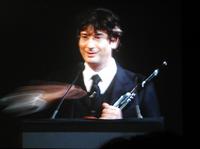 Neil Gaiman accepting the Best Short Story Hugo for "A Study in Emerald".
Neil Gaiman accepting the Best Short Story Hugo for "A Study in Emerald".
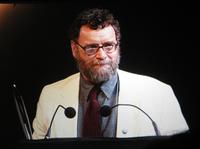 Michael Swanwick accepting the Best Novelette Hugo for "Legions in Time".
Michael Swanwick accepting the Best Novelette Hugo for "Legions in Time".
Posted by Leslie Turek at 12:22 AM in 5-Saturday | Permalink | Comments (6)
September 04, 2004
Around the con
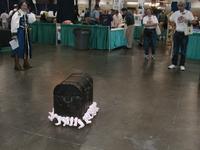 The Luggage was walking around in the ConCourse. (I got there just a minute too late to get a picture of Terry Pratchett watching it perambulate.)
The Luggage was walking around in the ConCourse. (I got there just a minute too late to get a picture of Terry Pratchett watching it perambulate.)
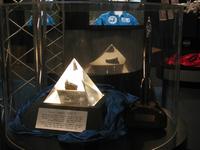 At the NASA exhibit, the Retro Hugo for Werner von Braun's The Conquest of the Moon had been added to the moon rock display.
At the NASA exhibit, the Retro Hugo for Werner von Braun's The Conquest of the Moon had been added to the moon rock display.
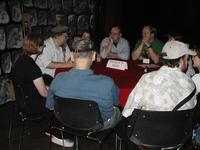 Literary Bheer in The Mended Drum with George R.R. Martin.
Literary Bheer in The Mended Drum with George R.R. Martin.
Posted by Leslie Turek at 11:58 PM in 5-Saturday | Permalink | Comments (2)
Hugo Awards
Best Novel - Paladin of Souls by Lois McMaster Bujold
Best Novella - "The Cookie Monster" by Vernor Vinge
Best Novelette - "Legions in Time" by Michael Swanwick
Best Short Story - "A Study in Emerald" by Neil Gaiman
Best Related Book - The Chesley Awards for Science Fictiion and Fantasy Art: A Retrospective by John Grant, Elizabeth L. Humphrey, and Pamela D. Scoville
Best Professional Editor - Gardner Dozois
Best Professional Artist - Bob Eggleton
Best Dramatic Presentation, Long Form - The Lord of the Rings: The Return of the King
Best Dramatic Presentation, Short Form - Gollum's Acceptance Speech at the 2003 MTV Movie Awards
Best Semi-Prozine - Locus, Charles N. Brown, Jennifer A. Hall, and Kirsten Gong-Wong, eds.
Best Fanzine - Emerald City, Cheryl Morgan, ed.
Best Fan Writer - Dave Langford
Best Fan Artist - Frank Wu
John W. Campbell Award for Best New Writer - Jay Lake
Special Noreascon Four Committee Award - Erwin "Filthy Pierre" Strauss
Posted by Noreascon 4 at 11:18 PM in 5-Saturday | Permalink | Comments (4)
Panel Report: Fantasy of Manners
Description: How do we define it? How do we draw the line, and what is its appeal? Is it a truth (universally acknowledged . . . ) that only women can write it? Lois McMaster Bujold, Ellen Kushner, Madeleine E. Robins (m), Jo Walton
People interested in the topic of this panel (described in as much detail as I can stand after the jump) might also like to read various discussions (including proposed reading lists) collected in my LiveJournal "memories", and this brand-new LiveJournal community.
The panel disposed of the question about whether only women can write it with a "No." Steven Brust was the immediate response; Alexi Panshin's Villiers books were mentioned later.
In the introductions, Ellen Kushner (EK) said "This is going to sound awful, but I invented Fantasy of Manners." Specifically, she suggested the term to Don Keller when he was writing the article citing her first novel Swordspoint as one of the key texts of this new thing he'd identified (his proposed label was Fourth Street something-or-other, after a con). EK said that it was just dumb luck that her book was first; she said that about a year later, Faren Miller reviewed a really great book in Locus that was much in the same vein, which of course got unfairly tagged as being heavily influenced by Swordspoint.
(Anyone have a guess at what this was? The panel couldn't bring the name to mind. The author was female.)
(By the way, EK is currently working on a novel set chronologically in-between Swordspoint and The Fall of the Kings, which features Alec as a ~40 year old who is now rich and powerful and pushes things one step too far.)
EK said that her second novel, Thomas the Rhymer, isn't FoM; I don't think I heard her say whether she thought Fall was or not.
Madeleine E. Robins (MR) said that her path into FoM was partly a quote of her mom's (attributed to Dorothy Parker), "A lady never offends anyone inadvertently." She thinks FoM is all about being really deliberate in negotiating the world.
I believe that around this point EK said that she was hoping the panel would be Fantasy of Manners 201 rather than 101, and in response, Lois McMaster Bujold (LMB) said that she was hoping that first they'd define the thing.
Jo Walton (JW) listed her elements of a definition (and noted that she thought she was on this panel because she likes to read this stuff, and was surprised to find that people thought her novel Tooth and Claw was FoM):
- It has to be fantasy.
- LMB: meaning that A Civil Campaign is science fiction of manners? JW: yes.
- It can be described as "like Jane Austen with (fill-in-the-blank)." Or Heyer.
- Which is one reason why she didn't think Tooth and Claw fit, because it's Trollope where all the people are dragons and eat each other, not Austen. (Late in the panel, EK said that she'd fallen in love with Trollope a few years ago and wanted to start a new movement, the Young Trollopes. Much groaning from the audience.)
- Which is one reason why she didn't think Tooth and Claw fit, because it's Trollope where all the people are dragons and eat each other, not Austen. (Late in the panel, EK said that she'd fallen in love with Trollope a few years ago and wanted to start a new movement, the Young Trollopes. Much groaning from the audience.)
- It has manners used as weapons.
- The events are small scale: they matter to the characters, but they don't change the entire world.
- Key works: Swordspoint, Patricia C. Wrede and Caroline Stevermer's Sorcery and Cecilia, Barbara Hambly's Stranger at the Wedding
- Sorcery and Cecilia, as discussed later on in the panel, is epistolary Regency-with-magic. The Hambly is middle-class FoM, I believe in the Regency period.
- Sorcery and Cecilia, as discussed later on in the panel, is epistolary Regency-with-magic. The Hambly is middle-class FoM, I believe in the Regency period.
- It's witty.
- Some people (ed. like your humble reporter) think it has to be non-passionate in tone, but she disagrees.
- This is the other reason she didn't think Tooth and Claw was the kind of thing people meant by FoM.
- This is the other reason she didn't think Tooth and Claw was the kind of thing people meant by FoM.
EK added that Keller either said or meant to say that while the story might not change the world, it matters to society and in that sense the fate of the world is at stake, because the characters' world is social.
MR said that class standing and hierarchy is very important. JW added that FoM is a way of exploring something that's not quite the historical period. (Somewhat later, JW said that in writing historical fiction, you have to be aware that people of those times have a lot of awful things in their mindsets, and of course you can change that, but you can only go so far before you're not historical anymore.) MR took this up, saying that a certain kind of historical romance drives her nuts, where the protagonist gets away with being a 1990s girl in an 1810 setting. She's interested in the way that FoM can allow a writer to feed in modern attitudes, as long as the story is anchored in the historical time; FoM is about ways that characters can subvert the system to their very small ends, in a very mannered way that makes it look like they're acting within society's rules. The weapons are always social and verbal.
(MR's two most recent novels, Point of Honour and its sequel, Petty Treason, are hardboiled Austen noir, about a Fallen Woman who makes a living doing private investigations. I haven't read the second yet, but I loved the first to pieces even though I disagree that it's FoM; I think hardboiled is a different category and the tone is wrong. I said as much later in the panel, to generally disagree that you could describe all FoM as "like Austen but," and MR kind of shrugged and said that she wasn't setting out to write FoM in the first place. Which is perfectly fair.)
People riffed on the verbal weapons for a bit; LMB said it was a great attraction because the characters get to say things you never get to say in Real Life. EK said that Alec, one of the main characters in Swordspoint, is exactly that: he can say anything he wants, and there's a guy with a sword who'll kill anyone who doesn't like it—great wish-fulfillment.
(Aside: that is precisely why I couldn't work up the enthusiasm to re-read Swordspoint for this panel.)
Rivka of Respectful of Otters asked whether FoM could be modern. JW thought that it maybe could; some people say the Bordertown shared universe is, which is modern-day, and of course there's A Civil Campaign. EK added that there is a tendency to see the genre as Regency, because of Sorcery and Cecelia and Heyer (described by Cynthia Heimel as "Bertie Wooster for girls"). LMB asked if the Godfather movies would fit; I'm not sure if the panel answered it, but the consensus of the people sitting around me seemed to be "sure." (I haven't seen them, not my kind of thing.) EK said that Sayers' Wimsey/Vane novels are FoM precursors of a sort. In response to a question I didn't hear, MR said that you couldn't have FoM in a military setting, because the response to snark would be, "You're out of line, soldier."
JW pointed out that you have to have class differences in order to have FoM. She didn't think you could have FoM on Beta Colony—this got some kind of reaction from LMB (Beta Colony is part of her Vorkosigan universe) that I didn't see because I was taking notes, but that the audience seemed to appreciate. Relatedly, she passed on a comment by Micole Sudberg that American manners novels are tragedies, British manners novels are comedies. There was then a brief, intense flurry of comments on class in America and Britain, which I didn't bother to write down because it was very fast and because I just really didn't feel like going there.
MR said that one of the fascinations of FoM is that you don't have to live that way. Another is that it has rules you can learn. (Sherwood Smith's Crown Duel was mentioned for its fan language (not language of fannish people, language of things you wave to cool off).) Later on, she said that everyone is adjusting manners all the time, but we have no idea we're doing it, and FoM is neat because they are aware of it. She mentioned working for a women who used straight BBC Received Pronunciation when talking to MPs, and East End London to talk to the help. (Victoria McManus in the audience said this is called "code switching.")
A brief interlude, as someone asked if Sharon Shinn's Samaria books are FoM. JW and EK both disagreed strongly; they've got society, but they're straight romances, no snark. I (and the rest of the people I was sitting with) agree.
EK then dragged the panel away from definitions because she wanted to talk about how she came to FoM. She said that when she made the big leap to working in publishing, which was the most structured and hierarchal thing she'd ever experienced, suddenly Austen made a lot more sense to her. Plus, she was living in a dangerous area, so she wrote about what was fascinating her at the time: manners, and violence (and sex).
The panel discussed some of the TV that Keller identified in his article. The Avengers seemed to be popular; MR said she wakes up every morning and says to herself, "Damn, I'm still not Emma Peel."
LMB got into FoM-type-things in her post-SF-only phase, when she found a bunch of Heyers in an overstock warehouse in her early twenties. She said her interest in Heyer laid dormant for a time, but she finds that there's something new in the books each time. (Jim Baen, she reports, reads Heyer.)
(MR noted that in Regency settings, it's easy to tell who's done their homework, and who's just read Heyer.)
LMB said that shortly after that, she found Dorothy Sayers, though not Dorothy Dunnett (who is also mentioned by Keller). MR bounces hard off Dunnett; EK loves her and Dunnett was part of the soup that Swordspoint came out of. (Dunnett is emphatically not FoM, though.)
The Saint books were mentioned (I'm ignorant here, can someone help in comments?). Somehow we got to EK saying that she thought hardboiled noir like Dashiell Hammett were Regencies for boys. This brought up honor for MR: FoM is about personal honor, societial honor, and the clash or contrast between. EK added that honor is a currency as well.
EK recommended Kage Baker's The Anvil of the World as delicious FoM. Someone in the audience said that Baker has a new collection with several stories set in that world as well.
About the last thing that was said was LMB reciting her definition of genre (I think it was hers), "a group of works in close conversation with each other." She thought that this discussion suggested that FoM is a very broad-based close conversation.
Posted by Kate Nepveu at 02:13 PM in 5-Saturday | Permalink | Comments (11)
Additional live reporting
I've become aware of a couple of other sites that are doing live reporting from N4. Cheryl Morgan's Emerald City has been doing regular updates. SFRevue Online says they're going to blog, but so far they haven't posted anything.
Posted by Leslie Turek at 09:02 AM in 5-Saturday | Permalink | Comments (2)